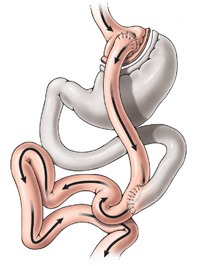- What does the surgery involve?
- How long does the procedure take?
- What scars will I have?
- How will I feel following surgery?
- How long will I need to stay in hospital?
- How long will I need off work?
- How long until I can exercise?
- How soon can I reintroduce solid foods?
- What will my eating be like long term?
- Will my appetite change?
- How much weight can I expect to lose?
- What do I need to do to ensure long term weight loss?
- Do I need to take vitamins after surgery?
- What health improvements can I expect?
- What are the risks of surgery?
What does the surgery involve?
"The gastric bypass involves stapling the stomach to produce a much smaller stomach, which will reduce from the size of the stomach from that of a Galia melon to the size of an egg. The second part of the operation involves bypassing the digestive secretions that are normally involved in absorption of foods. A loop of the small bowel is bought up to the new small stomach and connected to this. This new configuration bypasses the digestive secretions for half of the bowel length. Eventually food and secretions will remix half way down the bowel.

Diagram showing the rout that food takes following gastric bypass. A small meal will initially fill the stomach pouch before entering the bypassed part of the small bowel. This stimulates release of hormones that cause a pleasant feeling of satiety and fullness.
The gastric bypass therefore works in three distinct ways:
- The amount of food that can be consumed is reduced.
- There is a degree of malabsorption of some of the calories and nutrition in the food that is eaten (this malabsorption readapts after one year).
- The reconfiguration of the bowel produces a profound decrease in the patient's appetite, and a change in the patient's food preferences away from sweet or fatty foods and towards healthier foods."
How long does the procedure take?
"The procedure is under general anaesthetic and takes on average one hour."
What scars will I have?
"The procedure is laparoscopic or keyhole surgery, therefore there is no big scar. The procedure involves making five small cuts ranging from 5 mm to 12 mm long in the upper abdomen just below the rib cage."

Drawing showing the position of the 5 small scars after bypass surgery
How will I feel following surgery?
"The morning after surgery you should be able to walk around your private room, use the bathroom and shower. You should be able to sit comfortably and drink tea, smoothies or milk. Your pain should be well controlled with soluble painkillers. "
How long will I need to stay in hospital?
"Some patients will be keen to go home the day after surgery but most will prefer to stay and relax in the hospital and return home after the second night."
How long will I need off work?
"One or two weeks."

How long until I can exercise?
"You will be able to walk around within hours of surgery. The morning after surgery I would expect a patient to be able to walk around relatively comfortably. On discharge from hospital I would recommend increasing activity levels on a daily basis including longer and longer walks. More active exercise such as at the gym can be introduced one week after surgery, with a gentle reintroduction to aerobic exercise such as light jogging, cycling or swimming. Any exercise involving heavy lifting should be avoided for one month."
How soon can I reintroduce solid foods?
"The dietician will give you a detailed description of your pre and postoperative dietary instructions. Following surgery a liquid diet should be maintained for one week. This should be followed by a diet of pureed consistency food for one week. The third week should consist of mashed consistency foods and a slow introduction of well chewed solid food should be introduced thereafter. I advise patients to be particularly careful with bread and dried meat, such as chicken, for the first two months after surgery as these are the foods most likely to cause discomfort if not chewed properly."
What will my eating be like long term?
"Following a gastric bypass after the initial month where solid food is reintroduced, eating becomes much easier. Within two or three months you will be able to contemplate eating out. Clearly the amount of food will be much less and a starter portion will usually suffice, however patients report that the quality of life, as far as eating is concerned following a gastric bypass, is back to normal within a few months of surgery."
Will my appetite change?
"Following gastric bypass patients report profound changes in their appetite. The gastric bypass produces a reconfiguration of the digestive system, which tricks the brain into thinking that a person has eaten much more than they actually have. For this reason, after eating a small amount of food a patient will feel full and have a pleasant satiated feeling for many hours thereafter. Food is generally not an issue following gastric bypass and many patients will have to remind themselves to have lunch by setting a reminder alarm. The changes of appetite tend to last for at least twelve to eighteen months and in many cases for a longer term. In addition to this, most patients report that they develop an aversion to sweet foods and also to foods in high fat content. Sometimes this can be due to a syndrome called dumping which occurs after eating high fat or sugar foods. This causes a feeling of faintness, weakness and sweatiness and leads to the development of quite a rapid aversion to these types of foods, making weight loss much easier."
How much weight can I expect to lose?
"Following gastric bypass patients will lose about 80% of their excess weight. If a person weighs 20 stone but their ideal weight is 10 stone, then the excess weight they are carrying is 10 stone.
Following gastric bypass if they lose 80% of this excess weight, that will equal 8 stone of weight loss.
Therefore following gastric bypass this persons weight will decrease from 20 stone to the 12 stone level within nine to twelve months of surgery and remain at this level long term."
What do I need to do to ensure long term weight loss?

"The gastric bypass is extremely effective in producing excellent weight loss in the first year and changing the patient's appetites and food preferences to help maintain this long term weight loss. However it is vital that after surgery a patient changes their lifestyle significantly to help maintain this weight loss for the years to come. This would include changes in their eating pattern to ensure that they have a regular healthy breakfast, lunch and dinner. The stopping or cutting down of unhealthy high calorie foods and finally the introduction of a more active lifestyle. These changes should ensure that weight loss is maintained long term."
Do I need to take vitamins after surgery?
"Following gastric bypass there is a malabsorptive component to the surgery and therefore we advise that people take a vitamin and a mineral supplement long term following surgery. We also advise that vitamin B12 levels are measured regularly and that supplements are given to prevent any deficiency arising in the future."
What health improvements can I expect?

"Following surgery there are dramatic improvements in most of the conditions that are associated with obesity.
Type 2 diabetes, if diagnosed within the preceding five years, will have a 90% chance of going into complete remission. If type 2 diabetes has been present for longer than five years then it is more likely that it will be improved dramatically by surgery with a significant decrease in the amount of medication required and an improvement in the sugar control.
High blood pressure will be improved dramatically within a few months of surgery and usually will resolve completely.
Sleep apnoea in 80-90% of cases will resolve with patients not requiring a sleeping mask, and being able to sleep and rest easier and feel much more revitalised the next day.
Joint pain and osteoarthritis: degenerative joint problems secondary to long term weight problems are not reversible, however once a person has lost a considerable amount of weight, the pressure on the joints is decreased and invariably a person will report a considerable decrease in the amount of painkillers they need to take.
Following surgery the person's quality of life dramatically improves. Patients generally feel fitter, healthier, revitalised and generally stronger after surgery."
What are the risks of surgery?
"Within the first day or two after surgery there is a 2% chance of complications occurring. These include leakage from where the stomach and the bowel are joined together, or bleeding from where the stomach is stapled. In these unlikely circumstances either a blood transfusion or a further laparoscopic operation is required and a patient may require a longer stay in hospital. There are also small risks of leg thrombosis and embolisms. These risks are minimised by blood thinning injections, compression stockings, the short operation time and the early ambulation after surgery.
The long term risks of gastric bypass are also uncommon. They include vitamin or mineral deficiency if supplements are not regularly taken. Other rare long term complications include a small hernia developing at the site of instrument insertion in the abdominal wall, or an internal herniation or twist in the bowel, which can cause colicky abdominal pain and need investigation. In patients taking anti-inflammatory painkillers such as Aspirin or Brufen for medical conditions, such as arthritis, we recommend that an acid blocking tablet is also taken to prevent the development of a stomach ulcer at the site of the join between the stomach pouch and the small bowel. Long term risks after surgery are in the region of approximately 2% and therefore very rare."


